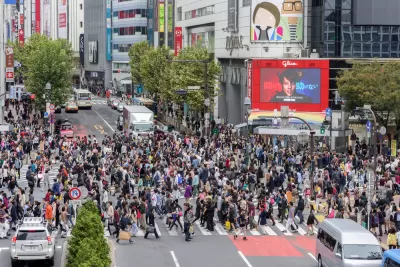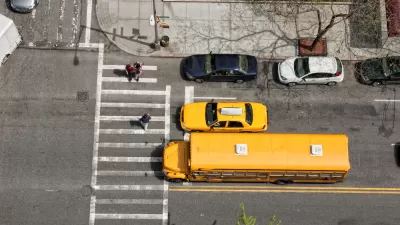Pedestrian blaming won't make pedestrians any safer, but cities are trying it anyways.

Angie Schmitt reports on a strange turn in traffic policy in reaction to climbing pedestrian fatality statistics.
"Last year, nearly 6,000 people were struck and killed while walking, a 25 percent increase since 2010," according to Schmitt. But the reaction of lawmakers has not been to "[reform] transportation and land use policies to make walking safer." Rather, cities are "doubling down on a dysfunctional system by blaming pedestrians for their own deaths."
Schmitt cites Honolulu's recent law that prohibits the use of a mobile phone while otherwise legally crossing the street on foot. That law is misguided, according to Schmitt. "The law won’t make people safer (data doesn’t support the idea that 'distracted walking' is a significant factor in rising pedestrian fatalities), but will lend itself to selective enforcement and racial profiling."
Cities are copying the idea anyway. Politicians in Cleveland and Stamford, Connecticut have proposed laws copying Honolulu's model.
FULL STORY: Honolulu’s Pedestrian-Blaming Law Sets Off a Round of Copycats

Planetizen Federal Action Tracker
A weekly monitor of how Trump’s orders and actions are impacting planners and planning in America.

Restaurant Patios Were a Pandemic Win — Why Were They so Hard to Keep?
Social distancing requirements and changes in travel patterns prompted cities to pilot new uses for street and sidewalk space. Then it got complicated.

Maui's Vacation Rental Debate Turns Ugly
Verbal attacks, misinformation campaigns and fistfights plague a high-stakes debate to convert thousands of vacation rentals into long-term housing.

Boulder Eliminates Parking Minimums Citywide
Officials estimate the cost of building a single underground parking space at up to $100,000.

Orange County, Florida Adopts Largest US “Sprawl Repair” Code
The ‘Orange Code’ seeks to rectify decades of sprawl-inducing, car-oriented development.

Maui's Vacation Rental Debate Turns Ugly
Verbal attacks, misinformation campaigns and fistfights plague a high-stakes debate to convert thousands of vacation rentals into long-term housing.
Urban Design for Planners 1: Software Tools
This six-course series explores essential urban design concepts using open source software and equips planners with the tools they need to participate fully in the urban design process.
Planning for Universal Design
Learn the tools for implementing Universal Design in planning regulations.
Heyer Gruel & Associates PA
JM Goldson LLC
Custer County Colorado
City of Camden Redevelopment Agency
City of Astoria
Transportation Research & Education Center (TREC) at Portland State University
Camden Redevelopment Agency
City of Claremont
Municipality of Princeton (NJ)





























